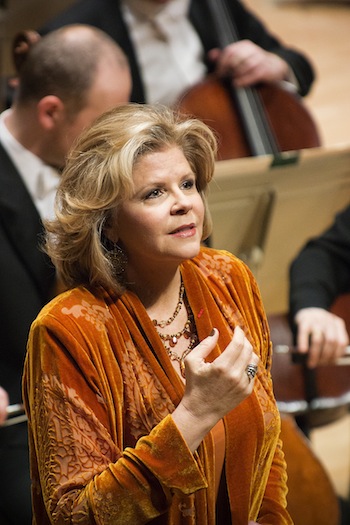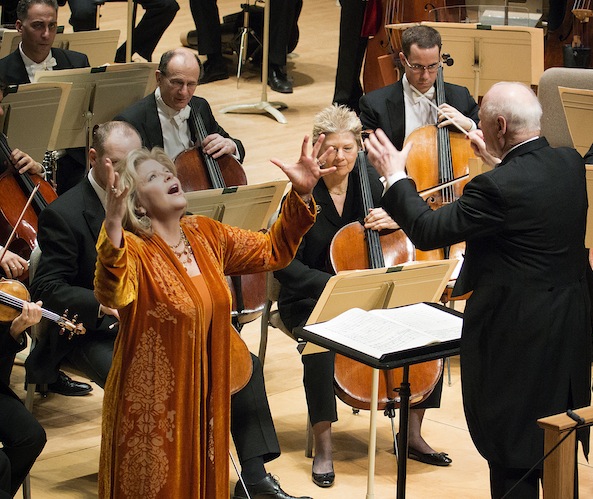Concert Review: All-Ravel at Symphony Hall
BSO’s conductor emeritus Bernard Haitink may be best known for his interpretations of Austro-German repertoire, but, on Saturday night, he channeled his inner Francophile.
By Jonathan Blumhofer

The superb mezzo-soprano Susan Graham singing “Shéhérazade” with the Boston Symphony Orchestra. Photo: Stu Rosner
“In this world nothing can be said to be certain, except death and taxes,” goes a familiar saying. To that short list, we might add one thing: the Boston Symphony Orchestra (BSO) can play the daylights out of anything by Maurice Ravel. Or so it seems after the conclusion to the orchestra’s most recent subscription series, this devoted to its favorite French composer. Bernard Haitink, the BSO’s conductor emeritus, directed the first of his two programs this season, which included the superb mezzo-soprano Susan Graham singing Shéhérazade.
The bulk of the evening was given to a complete performance Ravel’s biggest piece, the ballet Daphnis et Chloe. Written for the Ballets Russes in 1909, but not premiered until 1912 (it shared billing that season with Nijinsky’s provocative choreography of Debussy’s L’après-midi d’un faune), it is – by far – Ravel’s most ambitious score and, at many points, his most spectacular.
Haitink may be best known for his interpretations of Austro-German repertoire, but, on Saturday night, he channeled his inner Francophile. This was a glowing, fulgent reading that brought out some of the strongest playing of the season from individual members of the orchestra. Principal flute Elizabeth Rowe was arguably the star, her lustrous, agile solos delivered with plenty of flair and tonal variety; principal clarinet William Hudgins and principal horn James Sommerville also acquitted themselves admirably. It was particularly nice to see (and hear) Malcolm Lowe back in the concertmaster’s chair.
At the end of the day, Daphnis is a ballet and there are dry spells that need choreography to fully come across. Credit is due Haitink and the BSO, though, for making Saturday’s reading as vivid as they did. Both of the sunrise scenes were crystalline and the score’s most explosive moments were marked by a keen attention to textural detail.
The Tanglewood Festival Chorus (TFC) provided haunting color and imbued their wordless texts with moments of great excitement (including a vigorous Danse general to close out the piece). Especially fine was the transition between parts one and two, with its fantastically woozy choral writing giving way to brass interjections heralding a pirate party. It’s potentially treacherous music for choir that the TFC managed with ease and a fluid sense of musical drama.
Brilliant as it was, though, Daphnis – to these ears, at least – wasn’t the highlight of Saturday’s program. That distinction went to Graham’s Shéhérazade.
Written in 1903, Ravel’s three-movement song cycle on texts by Tristan Klingsor is filled with some of his finest music: the brilliantly colorful “Asie,” evocative as anything Ravel wrote; the famous, sensuous “La Flûte enchantée”; and the haunting, mysterious “L’Indifférént,” a movement that Ravel cryptically suggested held the key to his own emotional character.
Graham was born to sing this repertoire. “Asie” begins with three repetitions of that word, and, as Graham intoned them with her trademark rich mezzo, it was as though she were actually drawing back a curtain on a spectacular, exotic scene. And so the rest of the song unfolded: phantasmagoric, sometimes unsettling (“I’d like to see murderers smiling/while the headsman cuts an innocent head” runs one line), but altogether captivating.

Mezzo-soprano Susan Graham performing with Bernard Haitink and the Boston Symphony Orchestra. Photo: Stu Rosner.
“La Flûte enchantée” exists in another world, one much simpler but no less meaningful. Graham’s account of a servant girl hearing her lover playing the flute outside the window where she’s working was notable for its sweetness and sincerity.
The enigmatic “L’Indifférént” inhabits yet another expressive place, this one far more difficult to pin down, as Graham’s warm, dreamy reading established. Haitink and the BSO delivered a remarkably sensitive accompaniment throughout: there was a real sense of the orchestra being an extension of the singer’s voice, so well did the two fit together.
Saturday’s concert opened with a sparkling, witty run-through of Alborada del gracioso. For some, perhaps many, the orchestral version of this piece pales in comparison to the original solo piano setting. I’ve never felt that way (partly because my introduction to the piece was through Ernest Ansermet’s brilliant recording with the Orchestre de la Suisse Romande), and the BSO’s performance this weekend only reinforced my bias.
Alborada showcases winds, brass, and percussion with particular exuberance. Saturday’s reading included some distinctly fine bassoon playing, ranging from the jocular to the more refined; as well as remarkably precise brass (especially in the recurring fast triplet motive); and a delirious array of technicolor sounds from the battery of percussion that included a pair of harps, castanets, and a xylophone.
Jonathan Blumhofer is a composer and violist who has been active in the greater Boston area since 2004. His music has received numerous awards and been performed by various ensembles, including the American Composers Orchestra, Kiev Philharmonic, Camerata Chicago, Xanthos Ensemble, and Juventas New Music Group. Since receiving his doctorate from Boston University in 2010, Jon has taught at Clark University, Worcester Polytechnic Institute, and online for the University of Phoenix, in addition to writing music criticism for the Worcester Telegram & Gazette.
Tagged: Bernard Haitink, Boston Symphony Orchestra
